|
|
|
Sort Order |
|
|
|
Items / Page
|
|
|
|
|
|
|
| Srl | Item |
| 1 |
ID:
107148
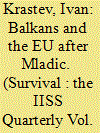

|
|
|
|
|
| Publication |
2011.
|
| Summary/Abstract |
Ten years after the last war in the region, the Balkans is still an assemblage of frustrated protectorates and weak states. Bosnia and Kosovo are trapped in the labyrinthine politics of semi-independence; Albania, Macedonia and Montenegro are small and claustrophobic republics with populist and divisive governments and opposition forces that are discouraged and discouraging at the same time. Serbia has not yet made up its mind how to reconcile its position on Kosovo with its aspiration to join the European Union. Croatia has succeeded in its accession talks with the EU, which closed on 30 June 2011, but the mood of the public is dire due to mismanagement and corruption scandals. The Balkans currently reflects a mixture of Greek-style economic problems, Berlusconi-style politics and Turkish-level hopes when it comes to joining the EU. With Italy and Greece facing deep political and economic troubles of their own, the Balkans has lost its natural advocates for EU membership.
|
|
|
|
|
|
|
|
|
|
|
|
|
|
|
|
| 2 |
ID:
135300
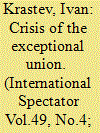

|
|
|
|
|
| Summary/Abstract |
The European elections failed to mobilise public support for the European project. Despite the strong showing of populist parties in the European Parliament, there are indications that the European Union would rather be transformed than destroyed by the current political crisis.
|
|
|
|
|
|
|
|
|
|
|
|
|
|
|
|
| 3 |
ID:
142905
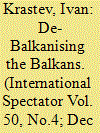

|
|
|
|
|
| Summary/Abstract |
More than a year after NATO intervention in Kosovo and the launching of the Stability Pact, Southeast Europe (SEE) still resembles a vast political laboratory. The region remains volatile, insecure and economically depressed. Support for democratic institutions is low, corruption is endemic, public expectations are pessimistic. There are clear differences from country to country, but on the whole, Southeast Europe continues to be characterised by weak states and both hard and soft protectorates.
|
|
|
|
|
|
|
|
|
|
|
|
|
|
|
|
| 4 |
ID:
142906


|
|
|
|
|
| Summary/Abstract |
In the year 2000, in the immediate aftermath of NATO’s military operation in former Yugoslavia, I wrote an article claiming that it would be the success of the reconstruction of the region that would define the historical legitimacy of NATO’s intervention, conducted in the absence of a UN Security Council resolution; that the internal weakness and dysfunctionality of the Balkan states were the major threat to the security of the region; and that neither democratisation nor European integration could be substitutes for proper state-building in the region.
|
|
|
|
|
|
|
|
|
|
|
|
|
|
|
|
| 5 |
ID:
158868


|
|
|
|
|
| Summary/Abstract |
In 1991, when the West was busy celebrating its victory in the Cold War and the apparent spread of liberal democracy to all corners of the world, the political scientist Samuel Huntington issued a warning against excessive optimism. In an article for the Journal of Democracy [2] titled “Democracy’s Third Wave,” Huntington pointed out that the two previous waves of democratization, from the 1820s to the 1920s and from 1945 to the 1960s, had been followed by “reverse waves,” in which “democratic systems were replaced . . . by historically new forms of authoritarian rule.” A third reverse wave was possible, he suggested, if new authoritarian great powers could demonstrate the continued viability of nondemocratic rule [3] or “if people around the world come to see the United States,” long a beacon of democracy, “as a fading power beset by political stagnation, economic inefficiency, and social chaos.”
|
|
|
|
|
|
|
|
|
|
|
|
|
|
|
|
| 6 |
ID:
137530
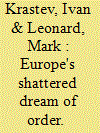

|
|
|
|
|
| Summary/Abstract |
Until recently, most Europeans believed that their post–Cold War security order held universal appeal and could be a model for the rest of the world. This conviction was hardly surprising, since Europe has often played a central role in global affairs. For much of the last three centuries, European order was world order—a product of the interests, ambitions, and rivalries of the continent’s empires. And even during the Cold War, when the new superpowers stood on opposite sides of the continent, the central struggle was between two European ideologies, democratic capitalism and communism, and over control of the European lands in between.
|
|
|
|
|
|
|
|
|
|
|
|
|
|
|
|
| 7 |
ID:
168634
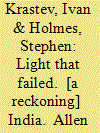

|
|
|
|
|
| Publication |
India, Allen Lane, 2019.
|
| Description |
246p.hbk
|
| Standard Number |
9780241345702
|
|
|
|
|
|
|
|
|
|
|
|
Copies: C:1/I:0,R:0,Q:0
Circulation
| Accession# | Call# | Current Location | Status | Policy | Location |
| 059745 | 320.51/KRA 059745 | Main | On Shelf | General | |
|
|
|
|
| 8 |
ID:
122360
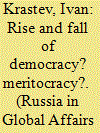

|
|
|
|
|
| Publication |
2013.
|
| Summary/Abstract |
The paradox of the modern world is that democratization of society has ironically led to voters' loss of power and the rise of social inequality while globalization liberated the elites but deprived them of legitimacy and capacity to govern.
|
|
|
|
|
|
|
|
|
|
|
|
|
|
|
|
| 9 |
ID:
080040
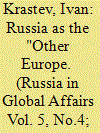

|
|
|
| 10 |
ID:
155656


|
|
|
| 11 |
ID:
081518


|
|
|
|
|
| Publication |
2008.
|
| Summary/Abstract |
From Gorbachev to Yeltsin to Putin, every new Russian president has drastically altered his country's relationship with the world. How will President Dmitry Medvedev change it again? Here are the clues that reveal what the Kremlin is thinking, and, more importantly, what it really wants
|
|
|
|
|
|
|
|
|
|
|
|
|
|
|
|
|
|
|
|
|